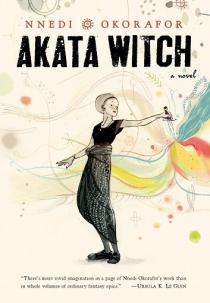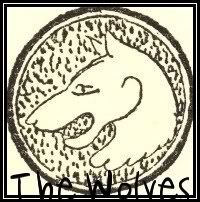by Nnedi Okorafor
 None of the other books I had picked for #Diversiverse had made their way to me yet, so last Thursday I stood in the YA section of the Lawrenceville branch of the Pittsburgh Carnegie Library and just scanned the shelves for non-white-sounding authors’ names. I remembered that I wanted to read a book by Ruth Ozeki, which brought me to the 7 or so books in the ‘O’ section, and my eyes tangled with ‘Okorafor’. A Nigerian-American female author whose book – Akata Witch – had commendations from both Ursula K. Le Guin and Diana Wynne Jones on it’s cover? Jackpot!
None of the other books I had picked for #Diversiverse had made their way to me yet, so last Thursday I stood in the YA section of the Lawrenceville branch of the Pittsburgh Carnegie Library and just scanned the shelves for non-white-sounding authors’ names. I remembered that I wanted to read a book by Ruth Ozeki, which brought me to the 7 or so books in the ‘O’ section, and my eyes tangled with ‘Okorafor’. A Nigerian-American female author whose book – Akata Witch – had commendations from both Ursula K. Le Guin and Diana Wynne Jones on it’s cover? Jackpot!
The book is about an albino girl named Sunny, who was born in the US to Nigerian parents, and taken home to West Africa when she was 9 years old. Three years later the story opens with her still struggling to fit in. She looks Nigerian, speaks perfect Igbo, and is a talented soccer player – but she is so sensitive to the sun that she can only play at night, and she must spend her days beneath a black umbrella or tucked away inside. Her schoolmates tease her, and her father wishes she hadn’t been born.
Sunny’s tentative friendship with Orlu (a boy who stuck up for her in a schoolyard fight) and Chichi (a mysterious girl who lives with her mother in a mud hut and reads incessantly) deepens into something much more powerful when the two kids reveal that they have magical powers – and that Sunny does too. They are all members of the Leopard People, an ancient world-wide race of magic-wielders. Sunny soon finds herself scrambling to learn how to use her powers, understand her place in this whole new world, and together with Orlu, Chichi, and another American boy named Sasha, track down and prevent the evil Black Hat Otokoto from murdering any more children.
This book was interesting and imaginative…but also a little bit dull, which seems like a direct contradiction! Something about the writing style, and specifically the voices of the characters seemed…flat. I felt like the spark was missing from the narrative, and this puzzled me immensely because the story was at the same time richly detailed and full of surprising quirks. Nigerian culture, and the magical world of the Leopard people poured from the pages. The hidden spaces of Leopard Knocks with it’s market streets and massive library, the way charms and acts of juju worked, the spirit faces that each person wore beneath their real one – all these details were colorful and somewhat familiar, but full of the zest of a different setting. Being transported to West Africa was, to me, just as exciting as exploring the landscapes and rules of a new fantasy world.
The straightforward story-arc with it’s typical hero’s journey did suffer a bit in contrast. Some of the main characters didn’t seem as fleshed out as many of the magical creatures Okorafor came up with (like the large red ghost hoppers that serenaded Sunny at night, or the artist wasp that made castles out of crumbs). Sunny’s friends are all characters commonly found in such stories. Sunny herself was a bit more vibrant, but not remarkably so.
 This is the first in a series, I believe, and for all my complaints I will most likely keep reading. Even if this book was somewhat uneven, I liked it a lot and I am eager to seek out more of Nnedi Okorafor’s books. She has won several awards, and one of her adult books – Who Fears Death – sounds particularly interesting to me. I am glad to have stumbled into her in my library last week!
This is the first in a series, I believe, and for all my complaints I will most likely keep reading. Even if this book was somewhat uneven, I liked it a lot and I am eager to seek out more of Nnedi Okorafor’s books. She has won several awards, and one of her adult books – Who Fears Death – sounds particularly interesting to me. I am glad to have stumbled into her in my library last week!
What she is doing with her writing is extremely important, after all. As she wrote in an article that was intended for the New York Times (but was never published):
“…it’s a fact that the genre of science fiction was birthed in the West. Few science fiction classics and contemporary works feature main characters of African descent, African mythologies, African locales, or address issues endemic to Africa. And until recently, next to none were written by African writers.
As a Nigerian-American, born and raised in the United States, what distanced me from science fiction novels early on was feeling that I was not a part of the stories; I didn’t exist in them. I suspect the same can be said for many African writers who might consider writing science fiction.“
When Okorafor didn’t find herself or her culture represented in sci-fi or fantasy stories, she decided to write herself into the narrative, while also taking advantage of a “literary tool which is practically made to redress political and social issues.” (The rest of her article is worth checking out.) We need more authors being gutsy enough to follow suit, and more readers who are willing to lift their voices and demand more books like Akata Witch.
Of course this is precisely what we’re doing right now through A More Diverse Universe! This post will be the 58th review submitted to Aarti’s list at BookLust, and there will be plenty more added before Sept. 27th brings this event to a close (although it’s never really over). #Diversiverse on, readers and writers!





I have had Okorafor’s work on my shelf for some time – namely, her Who Fears Death? I think it will probably be wonderful once I read it, but it’s about a victim of rape and I think terrible things continue to happen and I just can’t bring myself to read about all that quite yet… maybe in winter.
By: aartichapati on September 26, 2014
at 1:07 pm
Yeah…that sounds like something to put off for awhile longer. I did pick up her book Kabu Kabu at the library today – I’ll see what her short stories are like!
By: tuulenhaiven on September 29, 2014
at 8:27 pm
[…] that…) I raided my local library’s pleasantly diverse YA collection and turned up Akata Witch by Nnedi Okorafor and Mare’s War by Tanita S. Davis. I also read The Good Braider by Terry […]
By: Diversiversiversiverse…!! | what we have here is a failure to communicate on September 30, 2014
at 3:45 pm
[…] (What We Have Here is a Failure to Communicate) also reviews Akata Witch by Nnedi Okorafor (Viking 2011). “This book was interesting and imaginative…but […]
By: {diversity in lit} Friday #20 | omphaloskepsis on October 3, 2014
at 8:47 am